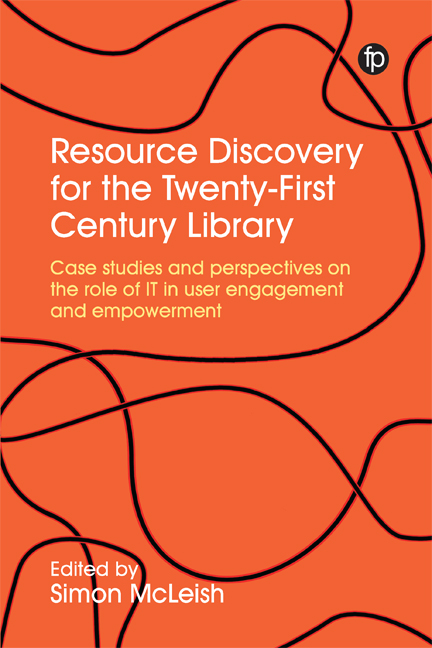Book contents
- Frontmatter
- Contents
- Figures and Tables
- Contributors
- Foreword: Library Discovery Directions
- 1 Introduction: Technology and Resource Discovery
- 2 Flipping the Catalogue: Taking Resource Discovery to the Next Level
- 3 Breaking the Record: Liberating Data into Knowledge at the National Library Board of Singapore
- 4 Case Study: Clearing Library Discovery-to-Access Pathways for IEEE Content
- 5 Case Study: Putting Discovery at the Heart of the Library Experience
- 6 Investigating Resource Discovery Needs at the University of Oxford
- 7 ‘Why Can’t you Just Use Google?’
- 8 Exposing Collections and Resources Effectively
- 9 Open Source Discovery using Blacklight at the University of Hull
- 10 A World of Curated Knowledge: Leveraging the Wider Semantic Web to Enhance Library Discovery
- 11 Cultural Discovery: Trends and Futures
- 12 Discovering the Future
- Editorial Afterword
- Index
2 - Flipping the Catalogue: Taking Resource Discovery to the Next Level
Published online by Cambridge University Press: 23 July 2020
- Frontmatter
- Contents
- Figures and Tables
- Contributors
- Foreword: Library Discovery Directions
- 1 Introduction: Technology and Resource Discovery
- 2 Flipping the Catalogue: Taking Resource Discovery to the Next Level
- 3 Breaking the Record: Liberating Data into Knowledge at the National Library Board of Singapore
- 4 Case Study: Clearing Library Discovery-to-Access Pathways for IEEE Content
- 5 Case Study: Putting Discovery at the Heart of the Library Experience
- 6 Investigating Resource Discovery Needs at the University of Oxford
- 7 ‘Why Can’t you Just Use Google?’
- 8 Exposing Collections and Resources Effectively
- 9 Open Source Discovery using Blacklight at the University of Hull
- 10 A World of Curated Knowledge: Leveraging the Wider Semantic Web to Enhance Library Discovery
- 11 Cultural Discovery: Trends and Futures
- 12 Discovering the Future
- Editorial Afterword
- Index
Summary
This chapter reviews the changing role of the catalogue in resource discovery, in particular for monographs. It:
explores the changes from a customer's user experience viewpoint
reviews the impact for libraries that move to a ‘just in need’ model
discusses the benefits of opening up the catalogue to be a self-service acquisition portal
demonstrates that reinventing the catalogue can bring a new aspect to resource discovery, with significant benefit to users; there have been challenges as well as transformations in service, leading to new expectations.
Introduction
Ranganathan proposed that ‘books are for use’ and we should ‘save the time of the reader’ (Ranganathan, 1931, 1 and 336). This sets the scene for our journey into a reinvention of the catalogue. Libraries have endured throughout our history, but today they are changing rapidly. Ranganthan's principles that books are for use and that we should save the time of the reader remain fundamental to the approach we should take in these times, and this is exemplified by recent work at the Australian National University, reinventing the library catalogue.
Libraries have collected an astounding array of resources to support knowledge seekers across a vast range of disciplines. In many ways the collections of research libraries are an investment for future and potential need, an issue that is finely balanced with current need and use, and which may relate to a fraction of the whole collection.
A major challenge has been to enable these potential users to locate and obtain access to these resources. Library and information scientists have studied information behaviour, sought to take on board technological developments and to enhance the metadata we create to open up access. The revolution of the online world has enabled us to develop more complex solutions, including new concepts such as linked data.
Over the past decades the techniques available to reveal resources have changed and improved. We are now in the era of UX, a time where our discovery services are being reviewed and renewed, see for example Curson (2016). Standing the test of time, Ranganathan's principles have been the fundamental premises for developments in resource discovery. The initiatives have sought to create a pathway between the library user and individual resources in library collections. Exploring new resource discovery solutions is now an important activity for research libraries.
- Type
- Chapter
- Information
- Resource Discovery for the Twenty-First Century Library , pp. 17 - 30Publisher: FacetPrint publication year: 2020
- 1
- Cited by



